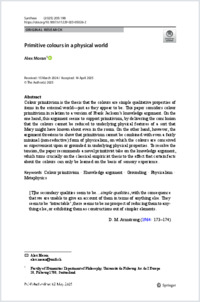Primitive colours in a physical world
BHAP-PH
- Moran, Alex ORCID University of Fribourg
- 2025
Published in:
- Synthese. - Springer Science and Business Media LLC. - 2025, vol. 205, no. 5
Physicalism
Colour
Grounding
Knowledge Argument
Metaphysics
Physicalisme
Métaphysique
Couleur
Grounding
Argument de la connaissance
English
Colour primitivism is the thesis that the colours are simple qualitative properties of
items in the external world—just as they appear to be. This paper considers colour
primitivism in relation to a version of Frank Jackson’s knowledge argument. On the
one hand, this argument seems to support primitivism, by delivering the conclusion
that the colours cannot be reduced to underlying physical features of a sort that
Mary might have known about even in the room. On the other hand, however, the
argument threatens to show that primitivism cannot be combined with even a fairly
minimal (non-reductive) form of physicalism, on which the colours are conceived
as supervenient upon or grounded in underlying physical properties. To resolve the
tension, the paper recommends a novel primitivist take on the knowledge argument,
which turns crucially on the classical empiricist thesis to the effect that certain facts
about the colours can only be learned on the basis of sensory experience.
items in the external world—just as they appear to be. This paper considers colour
primitivism in relation to a version of Frank Jackson’s knowledge argument. On the
one hand, this argument seems to support primitivism, by delivering the conclusion
that the colours cannot be reduced to underlying physical features of a sort that
Mary might have known about even in the room. On the other hand, however, the
argument threatens to show that primitivism cannot be combined with even a fairly
minimal (non-reductive) form of physicalism, on which the colours are conceived
as supervenient upon or grounded in underlying physical properties. To resolve the
tension, the paper recommends a novel primitivist take on the knowledge argument,
which turns crucially on the classical empiricist thesis to the effect that certain facts
about the colours can only be learned on the basis of sensory experience.
- Faculty
- Faculté des lettres et des sciences humaines
- Department
- Département de Philosophie
- Language
-
- English
- Classification
- Philosophy, psychology
- License
- Open access status
- hybrid
- Identifiers
-
- DOI 10.1007/s11229-025-05026-2
- ISSN 1573-0964
- Persistent URL
- https://folia.unifr.ch/unifr/documents/331874
Statistics
Document views: 163
File downloads:
- primitivecoloursinaphysicalworld: 65
